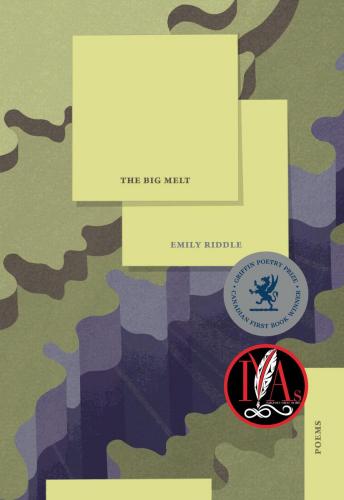The Big Melt is a debut poetry collection rooted in nehiyaw thought and urban millennial life events. It examines what it means to repair kinship, contend with fraught history, go home and contemplate prairie ndn utopia in the era of late capitalism and climate change. Part memoir, part research project, this collection draws on Riddle’s experience working in Indigenous governance and her affection for confessional poetry in crafting feminist works that are firmly rooted in place. This book refuses a linear understanding of time in its focus on women in the author’s family, some who have passed and others who are yet to come. The Big Melt is about inheriting a Treaty relationship just as much as it is about breakups, demonstrating that governance is just as much about our interpersonal relationships as it is law and policy. How does one live one’s life in a way that honours inherited responsibilities, a deep love for humour and a commitment to always learning about the tension between a culture that deeply values collectivity and the autonomy of the individual? Perhaps we find these answers in the examination of ourselves, the lands we are from and the relationships we hold.
“Emily Riddle's The Big Melt is an integral addition to the Indigenous poetic arena and enters adorned with historic seedling and contemporary sapling. Riddle positions herself between Vancouver and Edmonton and untangles the breathing ecosystem of ancestor and knowledge that lie beyond the “depth of a plow.” Her poetics are aglow with unceded prairie treaties and decolonial praxes; here, buried settlers become “ndn land itself” and askiy is always animate—a becoming and an oncoming. We are continually reminded of the breadth of kin we are in relation with—she animates the land as being, allowing it to speak, and never forgoes its desires. From within burial trees, nehiyawewin emerges, from within the personal enters the political, and from within such a melting we find a series of unearthed birthings. Riddle never lets us forget that “the most important intimacies are never spectacular” but rather they are beyond any singular compound noun that English surely stole.”
“Gentle, firm and funny, Emily Riddle uses The Big Melt to Aunty us all. This radically personal debut, like an iceberg or crater on the moon, reaches deep down into history—political, familial, environmental, romantical—to make sense of what it means to be an ndn on the prairies today who understands that the Oilers and West Edmonton Mall and miniskirts are sacred, and that this “bootlegging operation called Canada” can’t stop telling lies. There are truths here for us; the immense research behind the text feels like a lifetime labour of love, done out of necessity to reconcile loss and fashion some comfort in the face of colonial violence. What a gift it is for Riddle to show us, with clarity and wit, how fierce friendship and unshakeable matriarchs have helped her to connect with her ancestors, nehiyaw askiy, and herself.”
“It is a thrill to read the work of a writer so generously astute and playful in their poetics. In The Big Melt, Emily Riddle calls us to attention, reciprocity and place with wisdom and tenderness. These poems return us to course, reminding us what it means to live connected to one another through Treaty and through care, before turning with a sly wink to expose the irony, the insecurity and the impermanence of settler colonialism. Deeply funny and conscious, The Big Melt roots us here together, asks us to hold on to one another, and to go on.”
“Emily Riddle's collection, The Big Melt, reads like a love letter to the prairies, Indigenous identity, heritage and love (both lost and found). In language both sharp and accessible, with no need to obfuscate with metaphor, Riddle reminds us that love letters are also written to cut deep when they must, to push back and to complicate, while demanding all the parts of us be seen. This is a collection for everyone who wants a little reality (and McDonald’s) with their rebellion.”

